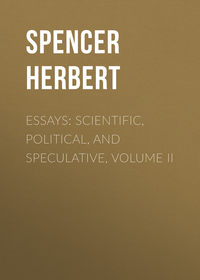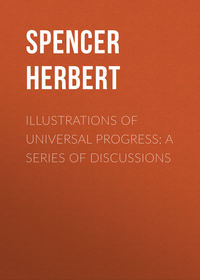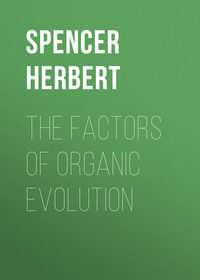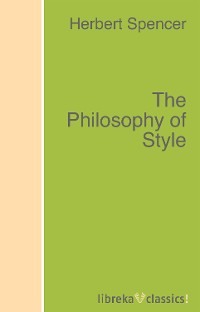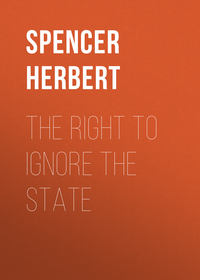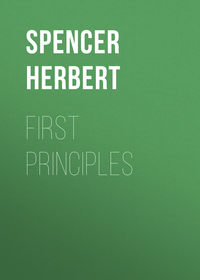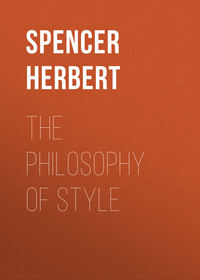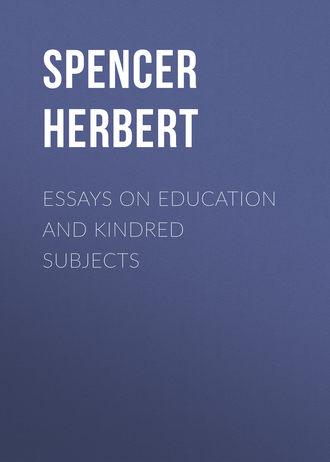 полная версия
полная версияEssays on Education and Kindred Subjects
Along with rote-teaching, is declining also the nearly-allied teaching by rules. The particulars first, and then the generalisation, is the new method – a method, as the Battersea School Reports remarks, which, though "the reverse of the method usually followed, which consists in giving the pupil the rule first," is yet proved by experience to be the right one. Rule-teaching is now condemned as imparting a merely empirical knowledge – as producing an appearance of understanding without the reality. To give the net product of inquiry, without the inquiry that leads to it, is found to be both enervating and inefficient. General truths to be of due and permanent use, must be earned. "Easy come easy go," is a saying as applicable to knowledge as to wealth. While rules, lying isolated in the mind – not joined to its other contents as out-growths from them – are continually forgotten; the principles which those rules express piecemeal, become, when once reached by the understanding, enduring possessions. While the rule-taught youth is at sea when beyond his rules, the youth instructed in principles solves a new case as readily as an old one. Between a mind of rules and a mind of principles, there exists a difference such as that between a confused heap of materials, and the same materials organised into a complete whole, with all its parts bound together. Of which types this last has not only the advantage that its constituent parts are better retained, but the much greater advantage that it forms an efficient agent for inquiry, for independent thought, for discovery – ends for which the first is useless. Nor let it be supposed that this is a simile only: it is the literal truth. The union of facts into generalisations is the organisation of knowledge, whether considered as an objective phenomenon or a subjective one; and the mental grasp may be measured by the extent to which this organisation is carried.
From the substitution of principles for rules, and the necessarily co-ordinate practice of leaving abstractions untaught till the mind has been familiarised with the facts from which they are abstracted, has resulted the postponement of some once early studies to a late period. This is exemplified in the abandonment of that intensely stupid custom, the teaching of grammar to children. As M. Marcel says: – "It may without hesitation be affirmed that grammar is not the stepping-stone, but the finishing instrument." As Mr. Wyse argues: – "Grammar and Syntax are a collection of laws and rules. Rules are gathered from practice; they are the results of induction to which we come by long observation and comparison of facts. It is, in fine, the science, the philosophy of language. In following the process of nature, neither individuals nor nations ever arrive at the science first. A language is spoken, and poetry written, many years before either a grammar or prosody is even thought of. Men did not wait till Aristotle had constructed his logic, to reason." In short, as grammar was made after language, so ought it to be taught after language: an inference which all who recognise the relationship between the evolution of the race and that of the individual, will see to be unavoidable.
Of new practices that have grown up during the decline of these old ones, the most important is the systematic culture of the powers of observation. After long ages of blindness, men are at last seeing that the spontaneous activity of the observing faculties in children has a meaning and a use. What was once thought mere purposeless action, or play, or mischief, as the case might be, is now recognised as the process of acquiring a knowledge on which all after-knowledge is based. Hence the well-conceived but ill-conducted system of object-lessons. The saying of Bacon, that physics is the mother of the sciences, has come to have a meaning in education. Without an accurate acquaintance with the visible and tangible properties of things, our conceptions must be erroneous, our inferences fallacious, and our operations unsuccessful. "The education of the senses neglected, all after education partakes of a drowsiness, a haziness, an insufficiency, which it is impossible to cure." Indeed, if we consider it, we shall find that exhaustive observation is an element in all great success. It is not to artists, naturalists, and men of science only, that it is needful; it is not only that the physician depends on it for the correctness of his diagnosis, and that to the engineer it is so important that some years in the workshop are prescribed for him; but we may see that the philosopher, also, is fundamentally one who observes relationships of things which others had overlooked, and that the poet, too, is one who sees the fine facts in nature which all recognise when pointed out, but did not before remark. Nothing requires more to be insisted on than that vivid and complete impressions are all-essential. No sound fabric of wisdom can be woven out of a rotten raw-material.
While the old method of presenting truths in the abstract has been falling out of use, there has been a corresponding adoption of the new method of presenting them in the concrete. The rudimentary facts of exact science are now being learnt by direct intuition, as textures, and tastes, and colours are learnt. Employing the ball-frame for first lessons in arithmetic exemplifies this. It is well illustrated, too, in Professor De Morgan's mode of explaining the decimal notation. M. Marcel, rightly repudiating the old system of tables, teaches weights and measures by referring to the actual yard and foot, pound and ounce, gallon and quart; and lets the discovery of their relationships be experimental. The use of geographical models and models of the regular bodies, etc., as introductory to geography and geometry respectively, are facts of the same class. Manifestly, a common trait of these methods is, that they carry each child's mind through a process like that which the mind of humanity at large has gone through. The truths of number, of form, of relationship in position, were all originally drawn from objects; and to present these truths to the child in the concrete is to let him learn them as the race learnt them. By and by, perhaps, it will be seen that he cannot possibly learn them in any other way; for that if he is made to repeat them as abstractions, the abstractions can have no meaning for him, until he finds that they are simply statements of what he intuitively discerns.
But of all the changes taking place, the most significant is the growing desire to make the acquirement of knowledge pleasurable rather than painful – a desire based on the more or less distinct perception, that at each age the intellectual action which a child likes is a healthful one for it; and conversely. There is a spreading opinion that the rise of an appetite for any kind of information implies that the unfolding mind has become fit to assimilate it, and needs it for purposes of growth; and that, on the other hand, the disgust felt towards such information is a sign either that it is prematurely presented, or that it is presented in an indigestible form. Hence the efforts to make early education amusing, and all education interesting. Hence the lectures on the value of play. Hence the defence of nursery rhymes and fairy tales. Daily we more and more conform our plans to juvenile opinion. Does the child like this or that kind of teaching? – does he take to it? we constantly ask. "His natural desire of variety should be indulged," says M. Marcel; "and the gratification of his curiosity should be combined with his improvement." "Lessons," he again remarks, "should cease before the child evinces symptoms of weariness." And so with later education. Short breaks during school-hours, excursions into the country, amusing lectures, choral songs – in these and many like traits the change may be discerned. Asceticism is disappearing out of education as out of life; and the usual test of political legislation – its tendency to promote happiness – is beginning to be, in a great degree, the test of legislation for the school and the nursery.
What now is the common characteristic of these several changes? Is it not an increasing conformity to the methods of Nature? The relinquishment of early forcing, against which Nature rebels, and the leaving of the first years for exercise of the limbs and senses, show this. The superseding of rote-learnt lessons by lessons orally and experimentally given, like those of the field and play-ground, shows this. The disuse of rule-teaching, and the adoption of teaching by principles – that is, the leaving of generalisations until there are particulars to base them on – show this. The system of object-lessons shows this. The teaching of the rudiments of science in the concrete instead of the abstract, shows this. And above all, this tendency is shown in the variously-directed efforts to present knowledge in attractive forms, and so to make the acquirement of it pleasurable. For, as it is the order of Nature in all creatures that the gratification accompanying the fulfilment of needful functions serves as a stimulus to their fulfilment – as, during the self-education of the young child, the delight taken in the biting of corals and the pulling to pieces of toys, becomes the prompter to actions which teach it the properties of matter; it follows that, in choosing the succession of subjects and the modes of instruction which most interest the pupil, we are fulfilling Nature's behests, and adjusting our proceedings to the laws of life.
Thus, then, we are on the highway towards the doctrine long ago enunciated by Pestalozzi, that alike in its order and its methods, education must conform to the natural process of mental evolution – that there is a certain sequence in which the faculties spontaneously develop, and a certain kind of knowledge which each requires during its development; and that it is for us to ascertain this sequence, and supply this knowledge. All the improvements above alluded to are partial applications of this general principle. A nebulous perception of it now prevails among teachers; and it is daily more insisted on in educational works. "The method of nature is the archetype of all methods," says M. Marcel. "The vital principle in the pursuit is to enable the pupil rightly to instruct himself," writes Mr. Wyse. The more science familiarises us with the constitution of things, the more do we see in them an inherent self-sufficingness. A higher knowledge tends continually to limit our interference with the processes of life. As in medicine the old "heroic treatment" has given place to mild treatment, and often no treatment save a normal regimen – as we have found that it is not needful to mould the bodies of babes by bandaging them in papoose-fashion or otherwise – as in gaols it is being discovered that no cunningly-devised discipline of ours is so efficient in producing reformation as the natural discipline of self-maintenance by productive labour; so in education, we are finding that success is to be achieved only by making our measures subservient to that spontaneous unfolding which all minds go through in their progress to maturity.
Of course, this fundamental principle of tuition, that the arrangement of matter and method must correspond with the order of evolution and mode of activity of the faculties – a principle so obviously true, that once stated it seems almost self-evident – has never been wholly disregarded. Teachers have unavoidably made their school-courses coincide with it in some degree, for the simple reason that education is possible only on that condition. Boys were never taught the rule-of-three until after they had learnt addition. They were not set to write exercises before they had got into their copybooks. Conic sections have always been preceded by Euclid. But the error of the old methods consists in this, that they do not recognise in detail what they are obliged to recognise in general. Yet the principle applies throughout. If from the time when a child is able to conceive two things as related in position, years must elapse before it can form a true concept of the Earth, as a sphere made up of land and sea, covered with mountains, forests, rivers, and cities, revolving on its axis, and sweeping round the Sun – if it gets from the one concept to the other by degrees – if the intermediate concepts which it forms are consecutively larger and more complicated; is it not manifest that there is a general succession through which alone it can pass; that each larger concept is made by the combination of smaller ones, and presupposes them; and that to present any of these compound concepts before the child is in possession of its constituent ones, is only less absurd than to present the final concept of the series before the initial one? In the mastering of every subject some course of increasingly complex ideas has to be gone through. The evolution of the corresponding faculties consists in the assimilation of these; which, in any true sense, is impossible without they are put into the mind in the normal order. And when this order is not followed, the result is, that they are received with apathy or disgust; and that unless the pupil is intelligent enough eventually to fill up the gaps himself, they lie in his memory as dead facts, capable of being turned to little or no use.
"But why trouble ourselves about any curriculum at all?" it may be asked. "If it be true that the mind like the body has a predetermined course of evolution – if it unfolds spontaneously – if its successive desires for this or that kind of information arise when these are severally required for its nutrition – if there thus exists in itself a prompter to the right species of activity at the right time; why interfere in any way? Why not leave children wholly to the discipline of nature? – why not remain quite passive and let them get knowledge as they best can? – why not be consistent throughout?" This is an awkward-looking question. Plausibly implying as it does, that a system of complete laissez-faire is the logical outcome of the doctrines set forth, it seems to furnish a disproof of them by reductio ad absurdum. In truth, however, they do not, when rightly understood, commit us to any such untenable position. A glance at the physical analogies will clearly show this. It is a general law of life that the more complex the organism to be produced, the longer the period during which it is dependent on a parent organism for food and protection. The difference between the minute, rapidly-formed, and self-moving spore of a conferva, and the slowly-developed seed of a tree, with its multiplied envelopes and large stock of nutriment laid by to nourish the germ during its first stages of growth, illustrates this law in its application to the vegetal world. Among animals we may trace it in a series of contrasts from the monad whose spontaneously-divided halves are as self-sufficing the moment after their separation as was the original whole; up to man, whose offspring not only passes through a protracted gestation, and subsequently long depends on the breast for sustenance; but after that must have its food artificially administered; must, when it has learned to feed itself, continue to have bread, clothing, and shelter provided; and does not acquire the power of complete self-support until a time varying from fifteen to twenty years after its birth. Now this law applies to the mind as to the body. For mental pabulum also, every higher creature, and especially man, is at first dependent on adult aid. Lacking the ability to move about, the babe is almost as powerless to get materials on which to exercise its perceptions as it is to get supplies for its stomach. Unable to prepare its own food, it is in like manner unable to reduce many kinds of knowledge to a fit form for assimilation. The language through which all higher truths are to be gained, it wholly derives from those surrounding it. And we see in such an example as the Wild Boy of Aveyron, the arrest of development that results when no help is received from parents and nurses. Thus, in providing from day to day the right kind of facts, prepared in the right manner, and giving them in due abundance at appropriate intervals, there is as much scope for active ministration to a child's mind as to its body. In either case, it is the chief function of parents to see that the conditions requisite to growth are maintained. And as, in supplying aliment, and clothing, and shelter, they may fulfil this function without at all interfering with the spontaneous development of the limbs and viscera, either in their order or mode; so, they may supply sounds for imitation, objects for examination, books for reading, problems for solution, and, if they use neither direct nor indirect coercion, may do this without in any way disturbing the normal process of mental evolution; or rather, may greatly facilitate that process. Hence the admission of the doctrines enunciated does not, as some might argue, involve the abandonment of teaching; but leaves ample room for an active and elaborate course of culture.
Passing from generalities to special considerations, it is to be remarked that in practice the Pestalozzian system seems scarcely to have fulfilled the promise of its theory. We hear of children not at all interested in its lessons, – disgusted with them rather; and, so far as we can gather, the Pestalozzian school have not turned out any unusual proportion of distinguished men: if even they have reached the average. We are not surprised at this. The success of every appliance depends mainly upon the intelligence with which it is used. It is a trite remark that, having the choicest tools, an unskilful artisan will botch his work; and bad teachers will fail even with the best methods. Indeed, the goodness of the method becomes in such case a cause of failure; as, to continue the simile, the perfection of the tool becomes in undisciplined hands a source of imperfection in results. A simple, unchanging, almost mechanical routine of tuition, may be carried out by the commonest intellects, with such small beneficial effect as it is capable of producing; but a complete system – a system as heterogeneous in its appliances as the mind in its faculties – a system proposing a special means for each special end, demands for its right employment powers such as few teachers possess. The mistress of a dame-school can hear spelling-lessons; and any hedge-schoolmaster can drill boys in the multiplication-table. But to teach spelling rightly by using the powers of the letters instead of their names, or to instruct in numerical combinations by experimental synthesis, a modicum of understanding is needful; and to pursue a like rational course throughout the entire range of studies, asks an amount of judgment, of invention, of intellectual sympathy, of analytical faculty, which we shall never see applied to it while the tutorial official is held in such small esteem. True education is practicable only by a true philosopher. Judge, then, what prospect a philosophical method now has of being acted out! Knowing so little as we yet do of psychology, and ignorant as our teachers are of that little, what chance has a system which requires psychology for its basis?
Further hindrance and discouragement has arisen from confounding the Pestalozzian principle with the forms in which it has been embodied. Because particular plans have not answered expectation, discredit has been cast upon the doctrine associated with them: no inquiry being made whether these plans truly conform to the doctrine. Judging as usual by the concrete rather than the abstract, men have blamed the theory for the bunglings of the practice. It is as though the first futile attempt to construct a steam-engine had been held to prove that steam could not be used as a motive power. Let it be constantly borne in mind that while right in his fundamental ideas, Pestalozzi was not therefore right in all his applications of them. As described even by his admirers, Pestalozzi was a man of partial intuitions – a man who had occasional flashes of insight rather than a man of systematic thought. His first great success at Stantz was achieved when he had no books or appliances of ordinary teaching, and when "the only object of his attention was to find out at each moment what instruction his children stood peculiarly in need of, and what was the best manner of connecting it with the knowledge they already possessed." Much of his power was due, not to calmly reasoned-out plans of culture, but to his profound sympathy, which gave him a quick perception of childish needs and difficulties. He lacked the ability logically to co-ordinate and develop the truths which he thus from time to time laid hold of; and had in great measure to leave this to his assistants, Kruesi, Tobler, Buss, Niederer, and Schmid. The result is, that in their details his own plans, and those vicariously devised, contain numerous crudities and inconsistencies. His nursery-method, described in The Mother's Manual, beginning as it does with a nomenclature of the different parts of the body, and proceeding next to specify their relative positions, and next their connections, may be proved not at all in accordance with the initial stages of mental evolution. His process of teaching the mother-tongue by formal exercises in the meanings of words and in the construction of sentences, is quite needless, and must entail on the pupil loss of time, labour, and happiness. His proposed lessons in geography are utterly unpestalozzian. And often where his plans are essentially sound, they are either incomplete or vitiated by some remnant of the old regime. While, therefore, we would defend in its entire extent the general doctrine which Pestalozzi inaugurated, we think great evil likely to result from an uncritical reception of his specific methods. That tendency, constantly exhibited by mankind, to canonise the forms and practices along with which any great truth has been bequeathed to them – their liability to prostrate their intellects before the prophet, and swear by his every word – their proneness to mistake the clothing of the idea for the idea itself; renders it needful to insist strongly upon the distinction between the fundamental principle of the Pestalozzian system, and the set of expedients devised for its practice; and to suggest that while the one may be considered as established, the other is probably nothing but an adumbration of the normal course. Indeed, on looking at the state of our knowledge, we may be quite sure that is the case. Before educational methods can be made to harmonise in character and arrangement with the faculties in their mode and order of unfolding, it is first needful that we ascertain with some completeness how the faculties do unfold. At present we have acquired, on this point, only a few general notions. These general notions must be developed in detail – must be transformed into a multitude of specific propositions, before we can be said to possess that science on which the art of education must be based. And then, when we have definitely made out in what succession and in what combinations the mental powers become active, it remains to choose out of the many possible ways of exercising each of them, that which best conforms to its natural mode of action. Evidently, therefore, it is not to be supposed that even our most advanced modes of teaching are the right ones, or nearly the right ones.
Bearing in mind then this distinction between the principle and the practice of Pestalozzi, and inferring from the grounds assigned that the last must necessarily be very defective, the reader will rate at its true worth the dissatisfaction with the system which some have expressed; and will see that the realisation of the Pestalozzian idea remains to be achieved. Should he argue, however, from what has just been said, that no such realisation is at present practicable, and that all effort ought to be devoted to the preliminary inquiry; we reply, that though it is not possible for a scheme of culture to be perfected either in matter or form until a rational psychology has been established, it is possible, with the aid of certain guiding principles, to make empirical approximations towards a perfect scheme. To prepare the way for further research we will now specify these principles. Some of them have been more or less distinctly implied in the foregoing pages; but it will be well here to state them all in logical order.
1. That in education we should proceed from the simple to the complex, is a truth which has always been to some extent acted upon: not professedly, indeed, nor by any means consistently. The mind develops. Like all things that develop it progresses from the homogeneous to the heterogeneous; and a normal training system, being an objective counterpart of this subjective process, must exhibit a like progression. Moreover, thus interpreting it, we may see that this formula has much wider application than at first appears. For its rationale involves, not only that we should proceed from the single to the combined in the teaching of each branch of knowledge; but that we should do the like with knowledge as a whole. As the mind, consisting at first of but few active faculties, has its later-completed faculties successively brought into play, and ultimately comes to have all its faculties in simultaneous action; it follows that our teaching should begin with but few subjects at once, and successively adding to these, should finally carry on all subjects abreast. Not only in its details should education proceed from the simple to the complex, but in its ensemble also.


